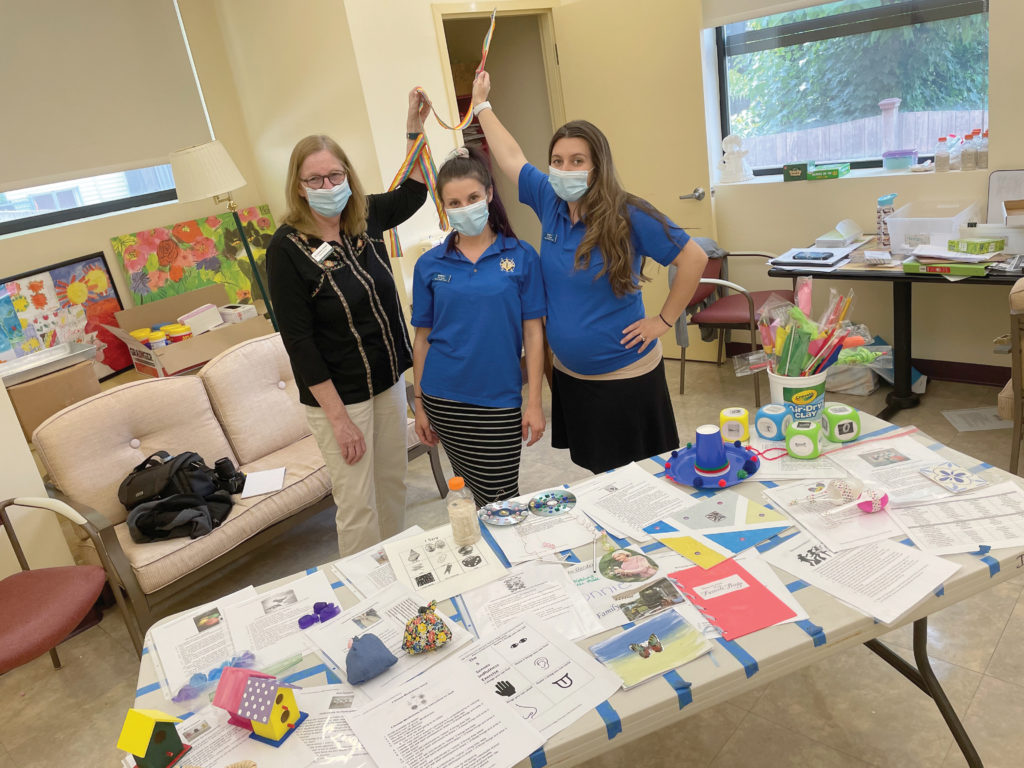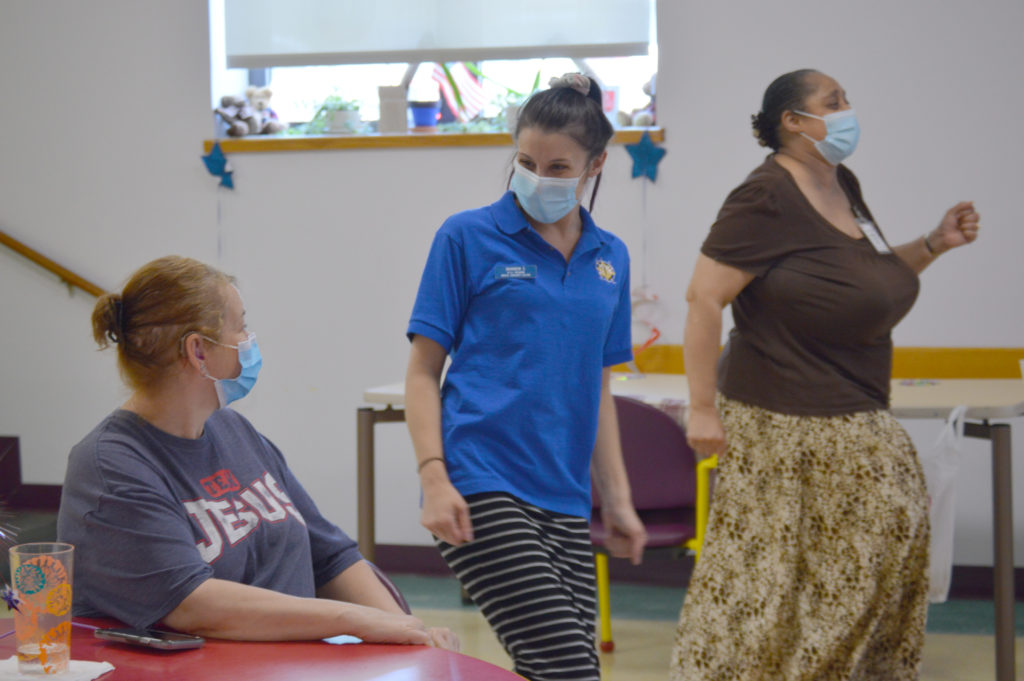
Bristol Community College Professor Constance Messier (left) helped students enrolled in the college’s occupational therapy assistant program develop activities for Project Independence participants. Shannon Correia (center) and Kendra Peixinho (right) are graduating from the program despite numerous challenges presented by the pandemic.
This article originally appeared in the July 2021 edition of Senior Scope. Article and photos by Seth Thomas.
As more Massachusetts residents are becoming vaccinated, the restrictions that have defined everyday life are easing in the state. At Project Independence, the reopening process has been slow and deliberate, and many of the musicians and fitness instructors who would normally visit the center have been absent for safety reasons.
But recently, the nonprofit was able to invite one outside group inside the agency for the first time in over a year: college students.
On June 10, Shannon Correia and Kendra Peixinho, two students from Bristol Community College, were leading Project Independence participants through activities. Both are enrolled in BCC’s occupational therapy assistant program, and the projects they designed were carefully considered and developed for their therapeutic value.
Occupational therapists often work with people with disabilities or injuries to overcome barriers. They assess their clients and help them find better ways to complete activities of daily living. And, after a year of lockdown and living with constant uncertainty, they added a much-needed sense of joy.
“It was so necessary. We’re so restricted because of COVID,” said Karen Maciulewicz, executive director of Project Independence. She said that while they will often welcome people from outside the agency to interact with participants, the strict safety protocols have prevented that from happening. But, she added, “BCC has brought all of that in for us.”
Countless challenges have confronted both the students and the community at Project Independence since March 2020. Days after the pandemic was declared a national emergency, Project Independence was forced to shut its doors to protect its clients and staff.
The New Bedford-based adult day health center, which serves older adults and adults with disabilities to prevent premature institutionalization, spent about six months providing remote services, whether it was connecting with clients and their caregivers over the phone or visiting their homes to check in.
By August 2020, Project Independence welcomed some of its participants back to its headquarters on Elm Street. Ten months later, many of the restrictions from the early days of the pandemic – masks, social distancing and capacity limits – are still in effect at the agency, even as the state has loosened restrictions elsewhere.
Prior to the pandemic, BCC had partnered with Coastline for a pilot program that paired Coastline consumers with students from the college’s occupational therapy assistant program. The students worked one-on-one with older adults with dementia to help them pursue leisure activities. For example, if a client’s visions problems interfered with their ability to complete a craft, the student would help the client adapt and find functional ways to carry out the task.
The pilot program also helped students fulfill one of their field work requirements, which is necessary to graduate. When COVID hit, the opportunities for students to work directly with consumers vanished, and the occupational therapy assistant program is now working through a backlog of students who still need to complete field work.
Project Independence, which has been a partner of the BCC program for more than five years, provided one of the only locations where students could work directly with clients.
“What the students needed was to understand the whole occupational therapy process: evaluations, designing interventions and developing a therapeutic relationship with the participants,” said Constance Messier, a BCC professor. “It’s expected that this is where they put their academics into practice.”

Shannon Correia (center) dances with participants at Project Independence.
At first, BCC was restricted to Zoom. The students were immediately confronted with a problem that has plagued virtually everyone who has ever used the software: how do you replicate the personal connections that form when meeting face-to-face over a conference call?
“Zoom was its own barrier in itself, but the students learned how to develop interactions, which were somewhat similar to telehealth,” said Messier. For example, the students created a lesson plan in which they assembled a craft, but incorporated memory skills throughout. This required detailed instructions and analysis so the assignment would benefit the participants as well as reinforce the students’ clinical reasoning skills.
As COVID restrictions eased, Project Independence was able to welcome a small group of students into the center, and Messier said they brought a different energy with them. That was evident on June 10, as participants proudly displayed projects they had been working on with Peixinho, and smiled behind their masks as Correia led the group through a dance. Correia said part of her goal is to put the “fun” in functional.
“Some people don’t always need to have fun in order to be motivated to do stuff, but I need that,” she said. “Things can be overwhelming, but having fun, interacting and socializing can motivate people to make improvements in their lives.”
The numerous projects the students developed have been assembled into a work book that will remain at Project Independence and provide a roadmap for leading participants through therapeutic activities.
Despite all the obstacles that have confronted the students on the road to graduation, there was a sense of optimism as the semester concluded.
“Adapting is a part of occupational therapy, but we were living it,” said Peixinho. “It’s important for us to be able to help. We were not going to let COVID stop us.”
Resources
Project Independence is accepting new clients at this time. To learn more about their services, call 508-997-1441 or visit them online at piadhc.org.
To learn more about how occupation therapy can help you. Contact BCC professor Constance Messier at Constance.Messier@bristolcc.edu.


Recent Comments